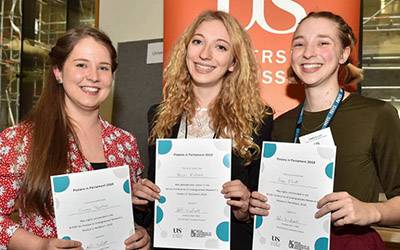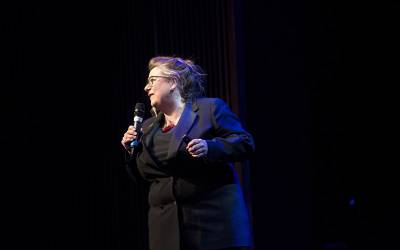We want our students to benefit from being part of our world-class research community.
Through the Connected Curriculum, our framework for research-based education, we seek to offer every student the opportunity to carry out research, at every level of study, challenging them to develop independent, critical thinking, as well as the skills they need for their future careers, so that they leave us inspired and ready to take on big challenges.
Professor Anthony Smith, UCL Vice-Provost (Education & Student Affairs)
Case study: UCL Student wins national Posters in Parliament competition
Natural Sciences student Alice Pistono presented on her dissertation research, in poster form, and won first prize at a national exhibition in the UK Houses of Parliament – Posters in Parliament.
The Posters in Parliament competition, inspired by the US Posters on the Hill event, gives more than 50 undergraduate students from universities across the UK the opportunity to present their research to legislators and policy makers in Westminster.
Alice was selected, along with a team of six second-year Biochemical Engineering students, to represent UCL after students presented their research posters to the UCL community at a lunchtime event and exhibition earlier in the year.
The judging panel was made up of academics and students who had to choose the two best posters to represent UCL from a group of 34 students from a wide range of courses.
Alice was awarded first place, with second place awarded to the UCL Biochemical Engineering students, whose research was focused on ‘Bioethanol production from longline seaweed in United Kingdom’.
Alice’s winning poster presented her dissertation – ‘DNA degradation under shifting temperature conditions’ – which has potential for forensic science applications and investigates how changing temperatures affect the degradation of DNA.
Our students discussed their research with Tanmanjeet Singh Dhesi, MP for Slough and UCL alumnus. Tanmanjeet said: "As a proud alumnus of UCL, it is truly wonderful to see a team engaged in innovative research, which can truly transform our society. So many of us are truly concerned about sustainability and our environment. It is great to see such innovative research."
Links: UCL Life Sciences/UCL Engineering
Case study: UCL Lecturer becomes UCL’s 1000th Arena fellow
Dr Anil Doshi, Lecturer in the Strategy and Entrepreneurship Group at the UCL School of Management, became UCL's 1000th Arena fellow in October 2019.
Anil achieved a nationally recognised Higher Education Academy (HEA) fellowships through UCL Arena.
UCL’s focus on teaching excellence means that gaining an HEA fellowship is a requirement for teaching staff as part of our Academic Career Framework.
More than a thousand UCL colleagues have been awarded HEA fellowships thanks to the UCL Arena Programme and there is now a total of 1,691 UCL staff with fellowships, including those who gained recognition in previous employment.
UCL Arena supports staff, from postgraduate teaching assistants to programme leaders, in their development and attainment by providing UCL's professional development pathway and offers several pathways to professional recognition. It also supports senior staff with strategic roles, and professional services staff that support teaching.
UCL Vice-Provost for Education and Student Affairs Professor Anthony Smith said: “By having colleagues who have committed to their own development and who have had their professional skills accredited, we can be sure we are giving our students a great education.”
Image: Anil Doshi
Links: UCL Arena/Anil Doshi/UCL School of Management
Case study: A new stage for research-based education
The historic Bloomsbury Theatre reopened in February 2019 following a £19.8m restoration, as part of the Transforming UCL programme.
The three and a half year project involved upgrading the theatre’s 541-seat auditorium, stage, rigging system and audio-visual features so students and staff can access the state-of-the-art facilities to carry out research and put on stage productions.
The Bloomsbury theatre, managed by UCL Culture, works together with students and researchers to bring ground-breaking discoveries to the stage – not just from arts and humanities subjects but from science and technology too.
Performance Lab, UCL Culture’s experimental new programme, aims to bring research to life through theatre and help academics, students and researchers to develop and share their work with a public audience in new and innovative ways.
“The Science of Laughter”, held in Performance Lab’s opening season, brought science and comedy together and saw neuroscientist Professor Sophie Scott (UCL Institute of Cognitive Neuroscience) hook up six audience members to various monitors while they watched comedians perform their sets. Sophie then shared the results with the audience and comedians to see what they had found most funny.
While the Bloomsbury theatre allows staff and students to experiment and create outside of their academic programmes, it also continues a broader programme of events featuring feature high profile and household names.
Simon Cane, Executive Director of UCL Culture, said: “We are excited to present a refreshed approach to our programming that offers a mix of new and experimental theatre, research-driven content and high-profile and household names.”
Image: Sophie Scott, The Science of Laughter. Credit: Belinda Lawley
Links: UCL Culture/UCL Arts & Humanities/UCL Brain Sciences
Further information
 Close
Close




